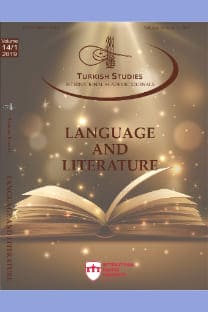TÜRK DİLİ VE EDEBİYATI BÖLÜMÜ ÖĞRENCİLERİNİN OSMANLI TÜRKÇESİNE YÖNELİK GÖRÜŞLERİ
Bu çalışma, üniversitelerin Türk Dili ve Edebiyatı bölümlerinde lisans düzeyinde okuyan öğrencilerin Osmanlı Türkçesi derslerine yönelik görüşlerini ortaya koymayı amaçlamaktadır. Çalışmada nitel araştırma desenlerinden biri olan olgu bilim (fenomenoloji) deseni kullanılmıştır. Çalışmanın verileri Tokat Gaziosmanpaşa Üniversitesi Fen Edebiyat Fakültesi Türk Dili ve Edebiyatı Bölümünde, farklı sınıflarda öğrenim gören ve yaşları 19 ila 26 arasında değişen 184 öğrenciden (123 kız, 61 erkek) toplanmıştır. Kolay ulaşılabilir örnekleme tekniğiyle seçilen öğrenciler, araştırmaya gönüllü olarak destek vermişlerdir. Veriler araştırmacı tarafından hazırlanan yarı yapılandırılmış görüşme formuyla toplanmıştır. Formda katılımcılara Osmanlı Türkçesi ile ilgili çeşitli sorular sorulmuş; katılımcıların verdikleri cevaplar içerik analizi tekniğiyle çözümlenmiştir. Araştırma sorularına göre gruplandırılan veriler, yüzde ve frekans değerleriyle sunulmuştur. Araştırmanın sonunda öğrencilerin Osmanlı Türkçesi derslerinde işlenen konuları beğenip beğenmedikleri, bu derslerdeki hislerinin olumlu mu olumsuz mu olduğu, hangi konularda zorlandıkları, ne tür yöntem ve etkinleri önerdikleri gibi konular çerçevesinde görüşleri değerlendirilmiştir. Buna göre öğrencilerin genel olarak dersi sevdikleri, gerekli gördükleri, derste zorlanmadıkları ve dersten korkmadıkları tespit edilmiştir. Osmanlı Türkçesi dersine karşı çoğunlukla olumlu bir bakış açısına sahip oldukları belirlenmiştir. Osmanlı Türkçesi derslerinde okuma yapma etkinliklerinin en beğenilen etkinlik türü olduğu görüşü öne çıkarılmıştır. Öğrencilerin dersin işlenişi ile ilgili tavsiyeleri arasında ise en çok öğrenci katılımının arttırılması ve okuma etkinliklerinin çoğaltılması yönündeki görüşleri yer almıştır.
THE OPINIONS OF TURKISH LANGUAGE AND LITERATURE DEPARTMENT STUDENTS ABOUT OTTOMAN TURKISH
In this study, it is aimed to reveal the opinions of the students who have been studying at the departments of Turkish Language and Literature about Ottoman Turkish courses. Phenomenological pattern, which is one of the qualitative research designs, was used in the study. The data were collected from 184 students (female= 123, male= 61, , aged between 19 and 26) studying in different classrooms at Tokat Gaziosmanpaşa University, Faculty of Science and Arts, Department of Turkish Language and Literature. The participants, who were selected convenience sampling technique, voluntarily supported the research. The data were collected by a semi-structured interview form prepared by the researcher. The participants were asked questions about Ottoman language. The participants’ answers were analysed with content analysis technique. The data grouped according to the research questions are presented with percentage and frequency values. At the end of the research, the students' opinions were evaluated within the framework of topics such as whether they liked the subjects taught in Ottoman Turkish lessons, whether their feelings in these lessons were positive or negative, which subjects were forced, what methods and activities they suggested. According to this, it was found that the students generally liked the course, found it necessary, did not have difficulty in the course and did not fear the course. It was determined that they had a positive point of view towards Ottoman Turkish course. It was emphasized that reading activities in Ottoman Turkish classes were the most popular activity type. Among the recommendations of the students regarding the course, their opinions about increasing the participation of students and increasing the reading activities were the most.
___
- Akpınar, Ş. (2016). “Osmanlı Türkçesi öğretimi üzerine.” Uluslararası Sosyal Araştırmalar Dergisi, 9 (44): 7-12.
- Avaroğulları, M. (2015). “Ortaöğretim kurumlarında okutulan Osmanlı Türkçesi dersine ilişkin öğretmen adaylarının görüşleri ve bu görüşleri etkileyen değişkenler.” Turkish Studies, 10 (15): 51-66.
- Baran, B. (2018). “Osmanlı Türkçesi öğretiminde Arapça, Farsça ve Eski Anadolu Türkçesinin yeri.” Uluslararası Türkçe Edebiyat Kültür Eğitim Dergisi, 7 (4): 2131-2142.
- Calp, M. (2017). “Türk Dili ve Edebiyatı Bölümü öğrencilerinin Osmanlı Türkçesindeki okuma hataları üzerine bir çalışma.” Uluslararası Türkçe Edebiyat Kültür Eğitim Dergisi, 6 (3): 1679-1705.
- Calp, M. (2018). “Osmanlı Türkçesi dersini alan öğrencilerin yaptıkları okuma, yazma ve gramer hatalarının sebepleri ve sağaltılmaları üzerine bir araştırma.” Kastamonu Eğitim Dergisi, 27 (4): 1757-1776.
- Christensen, L.B., Johnson, R.B. ve Turner, L.A. (2014). Research methods, design, and analysis. New Jersey: Pearson Education.
- Develi, H. (2014). Osmanlı Türkçesi kılavuzu 1. İstanbul: Kesit Yayınları.
- Ergin, M. (1975). Osmanlıca dersleri. İstanbul: İstanbul Üniversitesi Edebiyat Fakültesi Yayınları.
- Gümüşkılıç, M. (2009). “Türk dili ve edebiyatı bölümlerinde Osmanlı Türkçesi eğitimi.” 1st International Symposium on Sustainable Development. June 9-10, 2009, Sarajevo, Bosnia and Herzegovina.
- Kaya, R. (2013). “Tarih öğretmeni adaylarının lisans eğitiminde Osmanlıca öğretiminin işlevselliği ile ilgili görüşleri”. Atatürk Üniversitesi Sosyal Bilimler Enstitüsü Dergisi, 17 (2): 187-206.
- Özkan, B. ve Şahbaz, N.K. (2011). “Türkçe öğretmeni adaylarının alan derslerinin işlevselliğine yönelik görüşleri.” Sakarya Üniversitesi Eğitim Bilimleri Dergisi, 1 (1):32-43.
- Sevim, O. ve Bayındır, H. (2016). “Lise ve üniversite öğrencilerinin Osmanlı Türkçesi dersine yönelik görüşlerinin incelenmesi.” EKEV Akademi Dergisi, 20 (67):291-302.
- Timurtaş, F.K. (1991). Osmanlı Türkçesi grameri. İstanbul: İstanbul Üniversitesi Edebiyat Fakültesi Yayınları.
- Ulucan, M. (2016). “Osmanlı Türkçesinin öğretimi.” Millî Eğitim, S.212: 93-113.
- Yıldırım A., ve Şimşek, H. (2008). Sosyal bilimlerde nitel araştırma yöntemleri. Ankara: Seçkin Yayınları.
- ISSN: 2667-5641
- Yayın Aralığı: Yılda 4 Sayı
- Başlangıç: 2006
- Yayıncı: ASOS Eğitim Bilişim Danışmanlık Otomasyon Yayıncılık Reklam Sanayi ve Ticaret LTD ŞTİ
Sayıdaki Diğer Makaleler
19. YÜZYIL ŞİRVAN EDEBİ MECLİSİ BEYTÜ`S-SAFA TEMSİLCİLERİNDEN: MOLLA MAHMÛD ZÛ’Î
XVII.-XIX. YÜZYIL DOĞU TÜRK YAZI DİLİ İMLA GELENEĞİNDE MAHALLİLEŞME
DİN PSİKOLOJİSİ BAĞLAMINDA, İKİNCİ YENİ ŞİİRİNDE MİTOLOJİ
AHMED ŞEM’Î’NİN “HÜLÂSATÜ’L-AHLÂK” ADLI ESERİ VE AHLAKA DAİR GÖRÜŞLERİ
Ahmet DOĞAN, Seval Yinilmez AKAGÜNDÜZ
TÜRKÇE SÖZLÜK’TE “hlk.” ETİKETLİ SÖZLÜK BİRİMLERİN TANIMLANMASI: C ve Ç MADDE BAŞLARI ÖRNEĞİ
AHMED YESEVÎ’DEN ÂŞIK PAŞA’YA ON SAYISI
KAZAK DİYALEKTOLOJİ SÖZLÜĞÜ’NDE ARAPÇA VE FARSÇADAN GEÇEN KELİMELERDEKİ SES OLAYLARI
NAMIK KEMAL’İN NAZİRELERİ ÜZERİNE BİR ARAŞTIRMA
OĞUZ TÜRKÇESİ METİNLERİNDEN SALSAL-NĀME’NİN PARİS NÜSHASI
GÜMÜŞHANE İLİ VE YÖRESİ AĞIZLARINDA HAYVAN ADLARIYLA İLGİLİ SÖZ VARLIĞI
